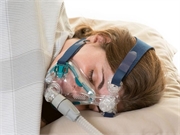- Could Your Grocery Store Meat Be Causing Recurring UTIs?
- Are You Making This Expensive Thermostat Error This Winter?
- Recognizing the Signs of Hypothyroidism
- 10 Strategies to Overcome Insomnia
- Could Artificial Sweeteners Be Aging the Brain Faster?
- Techniques for Soothing Your Nervous System
- Does the Water in Your House Smell Funny? Here’s Why
- Can a Daily Dose of Apple Cider Vinegar Actually Aid Weight Loss?
- 6 Health Beverages That Can Actually Spike Your Blood Sugar
- Treatment Options for Social Anxiety Disorder
Slimming Down ‘Tongue Fat’ Might Help Ease Sleep Apnea

People with sleep apnea are often told to lose weight to ease their symptoms. Now a new study suggests that shedding fat in a particular trouble spot may be key: the tongue.
If you didn’t know the tongue harbors body fat, you’re probably not alone.
“Most people aren’t thinking about tongue fat,” said senior researcher Dr. Richard Schwab, chief of sleep medicine at the University of Pennsylvania.
When it comes to sleep apnea, however, the anatomy of the tongue may be critical.
Obstructive sleep apnea (OSA) is a disorder in which the muscles of the throat fail to keep the airways open during sleep. That results in repeated interruptions in breathing — along with symptoms such as loud snoring and daytime grogginess due to poor sleep.
OSA is common — affecting an estimated 25 million Americans, according to the American Academy of Sleep Medicine. While it can affect people at any weight, obesity raises the risk.
Not everyone who is obese develops OSA, though. And in a 2014 study, Schwab’s team found that when you compare obese individuals with and without sleep apnea, those with the disorder typically have larger tongues with more fat tissue.
That brought up the question of whether losing tongue fat improves sleep apnea.
Weight loss is known to help ease the condition, Schwab said — but the precise pathways are not completely clear.
To see whether trimmer tongues might be one, his team studied 67 OSA patients who were obese and went through a weight-loss program — with either surgery or lifestyle changes alone.
In all, 47 managed to shed some pounds — about 14% of their starting weight, on average. The other 20 patients gained weight or remained stable.
Not surprisingly, patients who lost weight showed improvement in their sleep apnea: Before the study, they were having an average of 41 apnea “events” (pauses in breathing) every hour as they slept. After losing weight, that dropped to fewer than 19 per hour.
But MRI images done before and after the weight loss revealed some finer details: There was a direct correlation between loss of tongue fat and patients’ symptom improvement.
In fact, slimmer tongues explained about 30% of the benefit of patients’ weight loss.
People who lost weight also showed reductions in certain jaw and airway muscles — and those changes, too, seemed to improve apnea symptoms. But tongue fat was a more important factor.
The results were published Jan. 10 in the American Journal of Respiratory and Critical Care Medicine.
The findings are “not really surprising,” said Dr. Sabra Abbott, an assistant professor of sleep medicine at Northwestern University’s Feinberg School of Medicine in Chicago. She was not part of the study.
Given the nature of sleep apnea, she said, it makes sense that such changes in the anatomy of the upper airways would improve symptoms.
“This shouldn’t take away from the importance of overall weight loss,” Abbott said. Not only will it ease apnea symptoms, she noted, but it should also be a boon to a person’s general health.
Plus, Abbott pointed out, there’s no way to “spot reduce” tongue fat. “Until someone comes up with a tongue-selective form of fat loss, you have to lose overall body weight,” she said.
Schwab said that tongue liposuction is not in the cards. For one, the tongue does not hold big depots of fat that can easily be removed.
“It’s more like a steak that’s marbled,” he explained.
But Schwab does not discount the possibility of tongue-targeting therapies. One question, he said, is whether specific diet compositions affect the amount of fat, or fat loss, in the tongue.
He also noted that certain upper-airway exercises can improve sleep apnea — which he said raises the question, does tongue fat change when you do these exercises?
Finally, Schwab said studies might investigate noninvasive “cold therapy,” which is sometimes used to reduce small pockets of body fat by “freezing” and breaking down fat cells.
But Abbott was skeptical about cold therapy for the tongue. “I wouldn’t want to be the first person to have that,” she said.
Both doctors, however, said the findings underscore the value of weight loss for obese patients with OSA.
There are various treatments for the condition, including CPAP breathing machines and oral appliances worn during sleep. “But weight loss is the only way we have to cure it,” Abbott said.
More information
The National Sleep Foundation has more on sleep apnea.
Source: HealthDay
Copyright © 2026 HealthDay. All rights reserved.










